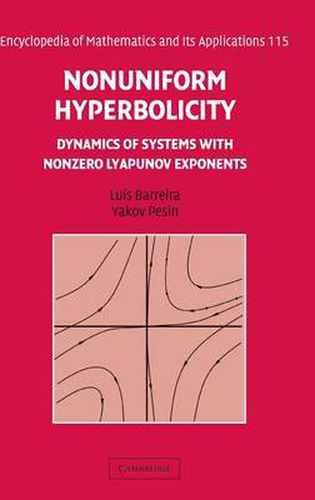Readings Newsletter
Become a Readings Member to make your shopping experience even easier.
Sign in or sign up for free!
You’re not far away from qualifying for FREE standard shipping within Australia
You’ve qualified for FREE standard shipping within Australia
The cart is loading…






Designed to work as a reference and as a supplement to an advanced course on dynamical systems, this book presents a self-contained and comprehensive account of modern smooth ergodic theory. Among other things, this provides a rigorous mathematical foundation for the phenomenon known as deterministic chaos - the appearance of ‘chaotic’ motions in pure deterministic dynamical systems. A sufficiently complete description of topological and ergodic properties of systems exhibiting deterministic chaos can be deduced from relatively weak requirements on their local behavior known as nonuniform hyperbolicity conditions. Nonuniform hyperbolicity theory is an important part of the general theory of dynamical systems. Its core is the study of dynamical systems with nonzero Lyapunov exponents both conservative and dissipative, in addition to cocycles and group actions. The results of this theory are widely used in geometry (e.g., geodesic flows and Teichmuller flows), in rigidity theory, in the study of some partial differential equations (e.g., the Schroedinger equation), in the theory of billiards, as well as in applications to physics, biology, engineering, and other fields.
$9.00 standard shipping within Australia
FREE standard shipping within Australia for orders over $100.00
Express & International shipping calculated at checkout
Designed to work as a reference and as a supplement to an advanced course on dynamical systems, this book presents a self-contained and comprehensive account of modern smooth ergodic theory. Among other things, this provides a rigorous mathematical foundation for the phenomenon known as deterministic chaos - the appearance of ‘chaotic’ motions in pure deterministic dynamical systems. A sufficiently complete description of topological and ergodic properties of systems exhibiting deterministic chaos can be deduced from relatively weak requirements on their local behavior known as nonuniform hyperbolicity conditions. Nonuniform hyperbolicity theory is an important part of the general theory of dynamical systems. Its core is the study of dynamical systems with nonzero Lyapunov exponents both conservative and dissipative, in addition to cocycles and group actions. The results of this theory are widely used in geometry (e.g., geodesic flows and Teichmuller flows), in rigidity theory, in the study of some partial differential equations (e.g., the Schroedinger equation), in the theory of billiards, as well as in applications to physics, biology, engineering, and other fields.